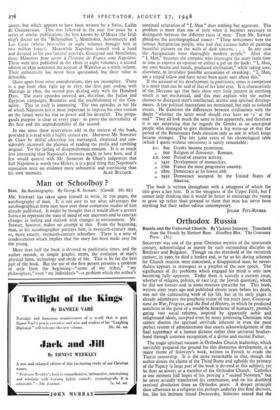Man or Schoolboy ?
Man. An Autobiography. By George R. Stewart. (Cassell. 10s. 6d.) MR. STEWART has taken upon himself to write, in 25o pages, the autobiography of man. It is not easy to say what advantages the autobiographical form may have over those competent studies of him already published. It might be thought that it would allow a greater licence to represent the state of mind of our ancestors and to contrast changes in feeling and outlook with changes in environment. Mr. Stewart, however, makes no attempt at this. From the beginning, man, as his autobiographer portrays him, is twentieth-century man, or, more exactly, twentieth-century schoolboy. There is a note of condescension which implies that the story has been made easy for the young.
More than half the book is devoted to prehistoric times, and the author records, in simple graphic terms, the evolution of man's physical form, technology and mode of life. This is by far the best part of the book. But the use of the first person presehts a problem of style from the beginning—" some of my tribes," " my philosophers," even " my individuals "—a problem which the author's
continual reiteration of " I, Man " does nothing but aggravate. The problem is more than one of style when it becomes necessary to distinguish between the different races of men. Then Mr. Stewart abandons the autobiographical stance : " These newcomers were the famous Aurignacian people, who had that curious habit of painting beautiful pictures on the walls of dark caverns. . . . In any case the Aurignacians were thoroughly modern people." After that " I, Man," becomes the compere who interrupts the story from time to time to express an opinion or collect a pat on the back : " I, Man, my own brains and hands, produced civilisation," while taking care, elsewhere, to invalidate possible accusations of swanking : " I, Man, am a stupid fellow and have never been quite sure about this."
If the account of his development in prehistoric times is competent it is more than can be said of that of his later eras. It is characteristic of the Meccano age that boys show very little interest in anything which is not mechanical, and this may explain why the author chooses to disregard men's intellectual, artistic and spiritual develop- ments. A few political innovations are mentioned, but only as isolated events. He dismisses the differences between civilisations with the doubt " whether the latter word should ever have an ' s ' at the end." They all look much the same to him apparently, and therefore it is not surprising that he regards the Greeks as an unoriginal people who managed to give themselves a big write-up or that the period of the Renaissance finds mention only as one in which kings became stronger. The last 3,000 years of his chronological table (which I quote without omissions) is surely remarkable:
B.C. 80o Greeks become prominent.
„ 600 Religion of Zoroaster. Romans.
A.D. I000 Period of creative activity.
1450 Development of monarchies.
1700 France the most progressive country.
1800 Democracy at its lowest ebb.
1932 Democracy accepted by the United States of America.
The book is written throughout with a smugness of which the title gives a fair hint. It is the smugness of the Upper Fifth, but I cannot help thinking that it would be better to encourage the young to grow up rather than pretend to them that man has never been anything but their rather odious contemporary.
JULIAN PITT-RIVERS.


































 Previous page
Previous page